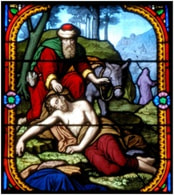 Thanks Deli, 6826 Fleetwood Road, McLean, VA Thanks Deli, 6826 Fleetwood Road, McLean, VA Give thanks with a grateful heart, Give thanks to the Holy One, Give thanks because He's given Jesus Christ, His Son. And now let the weak say, "I am strong," Let the poor say, "I am rich Because of what the Lord has done for us." Give thanks! (Henry Smith) “I probably won’t die from this,” muttered my housemate George. “I predict a full recovery,” chirped his girlfriend. George suffered from Medical Student’s Disease. People studying to be physicians and nurses quite often get Medical Student's Disease. Their textbooks and lectures spotlight irregular heartbeats, swellings, and pallid skin. And sure enough, George found these symptoms in himself! English majors can acquire their own version of Medical Student's Disease. Such a housemate one autumn became obsessed with foreshadowing. When someone spilled milk at breakfast, Marv speculated that a Big Revelation would come later. Did his basketball game go well? This, he forecast, meant that he would also slam dunk his next paper. Surge Bible studies recently have asked the question, "What does this tell us about God?" This question usually is worthwhile. However, as with Medical Student's Disease and Foreshadowing Syndrome, we should be wary of seeing what we want to see, whether less or more than the intended meanings. Around the year 231, a Christian scholar named Origen recommended asking of every scripture passage these three questions:
Today we stick to the literal meaning and application. But to Origen and others, symbolic explanation ruled. Origen demonstrated this kind of Bible interpretation throughout his Homilies on the Gospel of Luke. First, let's review how Jesus told the story of the Good Samaritan in Luke chapter 10:  “As a man was going down from Jerusalem to Jericho, some robbers attacked him. They tore off his clothes, beat him, and left him lying there, almost dead. It happened that a priest was going down that road. When he saw the man, he walked by on the other side. Next, a Levite came there, and after he went over and looked at the man, he walked by on the other side of the road. Then a Samaritan traveling down the road came to where the hurt man was. When he saw the man, he felt very sorry for him. The Samaritan went to him, poured olive oil and wine on his wounds, and bandaged them. "Then he put the hurt man on his own donkey and took him to an inn where he cared for him. The next day, the Samaritan brought out two coins, gave them to the innkeeper, and said, ‘Take care of this man. If you spend more money on him, I will pay it back to you when I come again.’” Concerning the Samaritan, Jesus concluded, "Go and do what he did!" Simple application was not enough for Origen. He explained that there is more in this story than meets the eye:
Origen saw the whole Bible as having a symbolic, allegorical layer worth more attention than the literal reading and application. His students eventually distinguished symbols about heaven from other symbols. These four perspectives —the literal, allegorical, moral, and aetheric—were sometimes represented as a team of four strong horses, the quadriga, that carried the believer away from error and closer to God. By the 400’s, you were not hearing a good sermon unless it found symbols in every phrase of a Bible verse. A preacher in France named Caesarius left a sermon on David and Goliath, observing, “Jesse his father sent David to search for his brothers, and God sent his only-begotten Son.” That would preach today. But Caesarius was just warming up. The ten cheeses David brought? “The ten commandments, which bound us to the Law!” The valley where David met Goliath? “This world, where Christ faced the devil!” David’s critical brother Eliab? “ The Jewish people, who jealously slandered Christ the Lord!” Caesarius felt he had slacked if he failed to insult Jews. Luther, Calvin, and other reformers could not entirely break from the fun of allegorizing. But they generally concluded, whoa, this has gotten out of hand. The practice of finding allegories had mutated from pious meditation to distraction and nonsense.  The 1997 Catechism of the Catholic Church prioritizes the literal and makes the quadriga less lampoonable: "According to an ancient tradition, one can distinguish between two senses of Scripture: the literal and the spiritual, the latter being subdivided into the allegorical, moral, and anagogical senses. … "The literal sense is the meaning conveyed by the words of Scripture and discovered by exegesis, following the rules of sound interpretation: All other senses of Sacred Scripture are based on the literal. "The spiritual sense. Thanks to the unity of God's plan, not only the text of Scripture but also the realities and events about which it speaks can be signs. The allegorical sense. We can acquire a more profound understanding of events by recognizing their significance in Christ; thus the crossing of the Red Sea is a sign or type of Christ's victory and also of Christian Baptism. The moral sense. The events reported in Scripture ought to lead us to act justly. As St. Paul says, they were written "for our instruction". The anagogical sense (Greek: anagoge, “leading”). We can view realities and events in terms of their eternal significance, leading us toward our true homeland: thus the Church on earth is a sign of the heavenly Jerusalem." This Vatican statement commends what many Reform Christians approve: The words of scripture have only one meaning, period. However, some events and objects recorded in scripture are not just historical, but also are God’s show and tell: “The law is only a shadow of the good things that are coming—not the realities themselves. For this reason it can never, by the same sacrifices repeated endlessly year after year, make perfect those who draw near to worship… we have been made holy through the sacrifice of the body of Jesus Christ once for all.” Hebrews 10 The question to ask: Is each event in scripture an object lesson, a shadow, a sign for the observant? Certainly one can draw application from events in the Bible, such as the rebellions against Moses: “Now these things occurred as examples to keep us from setting our hearts on evil things as they did. … We should not test Christ, as some of them did—and were killed by snakes. And do not grumble, as some of them did—and were killed by the destroying angel.” 1 Corinthians 10 Application requires discernment. Just because one suffers a calamity does not mean God is punishing him or her. Joseph ran from an affair, and was thrown in jail. Jeremiah spoke truth to power, and was thrown in jail. Peter healed a man, and was thrown in jail. Paul preached the gospel, and was thrown in jail. My med student roommate George finally found that his palpitations were better explained by a combination of not enough experience and too much coffee. He healed, and became a healer. Likewise, my English major friend Marv stopped seeing falling leaves as prompts for despair. Perhaps it was the trick endings of O. Henry that restored him, perhaps it was a girl. The world lost an oracle and gained a professor of English. Marv has since authored illuminating books on prayer, C.S. Lewis, and various literary subjects. Where your treasure is, there will your analogy be also. Sometimes, a cheese is just a cheese.
0 Comments
Leave a Reply. |
Our Writers:At The Surge we love doing things together... that includes writing a blog! Here are a few of our main contributing authors: Greg JohnsonJesus++ Dwaine DarrahOur fearless leader, Dwaine is the lead pastor at The Surge. His experience in counter terrorism with the CIA prepared him for ministry and he likes dogs and babies even more than E does. EE (short for Eric Reiss) is the Wingman at The Surge and likes dogs, music, Mexican food, his wife Karen and his little girl Evangeline... not necessarily in that order. Archives
June 2024
Categories
All
|
|
|
The Surge Community Church
Meeting Sunday Mornings at The State Theatre in Falls Church, 11:10am! Rebroadcast Available Sunday Evenings with SurgeOnDemand, 7:00pm! |




 RSS Feed
RSS Feed
